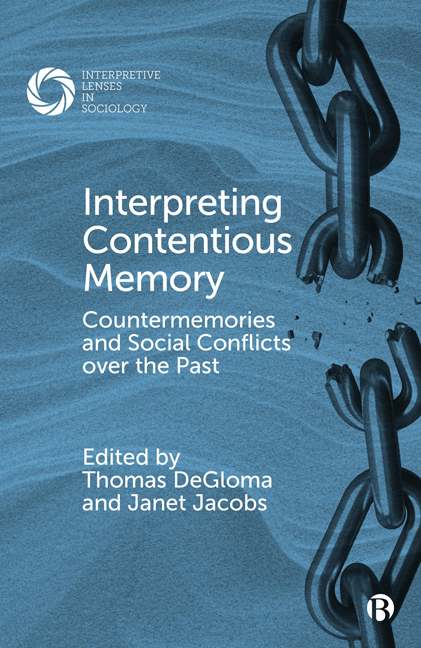Book contents
- Frontmatter
- Contents
- Series Editors’ Preface: Interpretive Lenses in Sociology – On the Multidimensional Foundations of Meaning in Social Life
- Notes on Contributors
- Acknowledgments
- 1 Introduction: Interpreting Contentious Memories and Conflicts over the Past
- PART I Interpreting Memories in the Social Dynamics of Contention
- PART II Racism, Exclusion, and Mnemonic Conflict
- PART III Genocide, Memory, and the Historicizing of Trauma
- Index
5 - The Ballot of Donald and Hillary: Hateful Memories of Celebrity Leaders
Published online by Cambridge University Press: 20 January 2024
- Frontmatter
- Contents
- Series Editors’ Preface: Interpretive Lenses in Sociology – On the Multidimensional Foundations of Meaning in Social Life
- Notes on Contributors
- Acknowledgments
- 1 Introduction: Interpreting Contentious Memories and Conflicts over the Past
- PART I Interpreting Memories in the Social Dynamics of Contention
- PART II Racism, Exclusion, and Mnemonic Conflict
- PART III Genocide, Memory, and the Historicizing of Trauma
- Index
Summary
Shortly after the presidential election of 1968, the honored liberal cartoonist Herblock, a longtime and bitter critic of Richard Nixon, published a cartoon in the Washington Post. Herblock had previously depicted Nixon with a nasty-looking five o’clock shadow. Now, there is a sign in the cartoonist's barbershop: “This shop gives to every new president of the United States a free shave.” Herblock suggested that each elected leader deserves a fresh start, even the ones we dislike.
Some presidents do not receive their free shave. For some elected leaders, a significant portion of the population despises them during the campaign, and these emotions only grow stronger after the election. This is often true for the victors and the vanquished alike, who can each generate feelings of disgust.
In a political system committed to electoral democracy, this is puzzling. Given the likelihood of skeletons in the closets of some (if not most) prominent public servants, why should the public reputation of political figures adored by many come to be reviled by others? How is partisan success meaningfully linked with public representations of moral failure or despicable character? How might collective memory of polarizing presidencies in polarized times be shaped through the uses (and abuses) of the reputations of controversial political figures? Why, given our case, were Donald Trump and Hillary Clinton, two accomplished Americans in their own ways, so intensely disliked by large segments of the electorate? Why, once elected, did Donald Trump not receive his free shave?
To explore the creation of contentious reputations, our chapter builds on an earlier analysis (Fine and Eisenberg, 2002) that described the barbed animosity aimed at Richard Milhous Nixon and William Jefferson Clinton. These two United States presidents were elected for two terms each despite numerous detractors who not only rejected their policies – a legitimate practice in competitive democracies – but loathed their personas and their pasts, suggesting that as persons they lacked integrity and as presidents they lacked legitimacy. In the eyes of detractors, a president with a loathsome reputation threatens the authority of the office. That essay argued that the hatred was tied to generational politics: Nixon was linked to his role in the McCarthy, communist-hunting era of the late 1940s and early 1950s, and Clinton to the radical youth politics of the 1960s that he and his wife symbolized.
- Type
- Chapter
- Information
- Interpreting Contentious MemoryCountermemories and Social Conflicts over the Past, pp. 89 - 110Publisher: Bristol University PressPrint publication year: 2023

